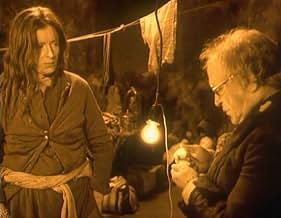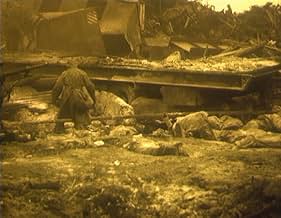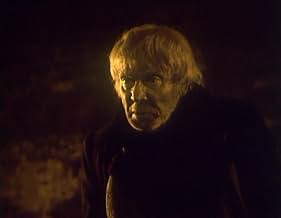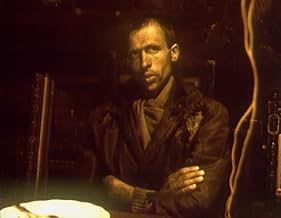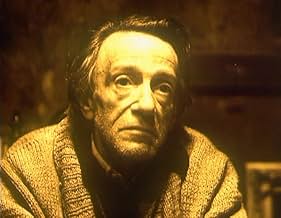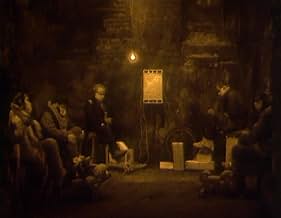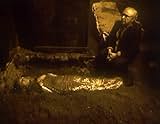Dopo lo scoppio della guerra nucleare che ha devastato la Terra un professore rintanatosi in un bunker cerca il figlio Eric disperso nei bombardamenti il tutto mentre i rifugiati attorno a l... Leggi tuttoDopo lo scoppio della guerra nucleare che ha devastato la Terra un professore rintanatosi in un bunker cerca il figlio Eric disperso nei bombardamenti il tutto mentre i rifugiati attorno a lui riflettono sulla natura umana.Dopo lo scoppio della guerra nucleare che ha devastato la Terra un professore rintanatosi in un bunker cerca il figlio Eric disperso nei bombardamenti il tutto mentre i rifugiati attorno a lui riflettono sulla natura umana.
- Regia
- Sceneggiatura
- Star
- Premi
- 1 vittoria in totale
- Khyummel-otets
- (as I. Ryklin)
- Anna
- (as V. Mayorova)
- Pastor
- (as V. Dvorzhetskiy)
- Tereza
- (as S. Smirnova)
- Vrach
- (as Ye. Platokhin)
Recensioni in evidenza
The nuclear catastrophe, we are told, happened by accident. Most of the few remaining survivors are physically or mentally sick, going about zombie-like, and slowly dying off in a few dimly lit underground shelters. The situation above ground is even worse, with high-radiation, wreckage, rubble, strong winds and little light (some kind of "nuclear winter"), rotting corpses everywhere.
The main character is an old scientist who tries to preserve some sense of purpose, inter alia by continuing his work and by writing letters to his missing and most likely dead son, letters that are not sent because there is no address to send them to. The acting by R. Bykov who plays the scientist, is impeccable, and the same goes for the rest of the cast, although it seems out of place to think and comment on these matters in a film dominated by sheer horror.
The limited colour gamma used (mostly dirty ochres, greys and blacks) effectively reinforce the feeling of oppression and hopelessness this film so effectively conveys from beginning to end.
Very hard and painful to watch, but perhaps necessary to get an idea of what our world could look like, were we to use the horrific weapons we have created. Did in fact look like, for some, when these weapons were used at the end of WWII.
This movie is a warning. It is scary to think how many times the world was on the verge of the Apocalypse. Not the divine Apocalypse, but one that can fly on the wings of a rocket launched by a foggy enemy.
Rolan Bykov, I was once again convinced of this, one of the best actors of Soviet cinema. He so organically played the role of the "Dead" ... well, what can I say? Master!
The letters that the hero of Bykov (incidentally, a professor who received the Nobel Prize) writes to his late son, only reinforce the already gloomy atmosphere of the film.
But, nevertheless, there is some optimism in the film. What can not but rejoice. However, I was insincere when I said that the film sucked all the positive emotions out of me. One more thing remains: hope. Part of me hopes that one day we will wake up and the world will no longer have nuclear weapons. But the other part, however, understands that a world without nuclear weapons is the world that is discussed in this film. This is a world in which there is nothing that holds back human destructive nature.
A scary movie ... hopefully not prophetic.
<b id="_d">...</b>
The story revolves on Rolan Bykov as a scientist – former Nobel Price winner, even – who entrenched himself underneath the remnants of a library building along with his wife and a handful of co-workers. The titular letters are addressed to his son whom the scientist hasn't seen or heard from since the catastrophe. The letters and above all the hope his son is still alive somewhere is what keeps the poor man going, but how long can you hold on to hope when you see everything and everyone around you dying? "Letters from a Dead Man" is a difficult but ultimately very rewarding cinematic experience to endure. Difficult, of course, because of the emotionally devastating imagery and atmosphere, and because there's actually very little substantial content. We literally stare at a handful of people languishing and eventually dying, with only a small hint at hope near the end. And rewarding because of the depiction of genuine humane sentiments and the thought-provoking messages. It's also highly remarkable how "Letters from a Dead Man" remains continuously vague regarding the cause of the apocalypse and eventually even searches the guilt in the own heart. In a time where movies released on the other side of the Iron Curtain (in Europe and particularly the USA) routinely blamed Russia for the potentially upcoming apocalypse, this tale suggests the root cause of the catastrophe lies in a human error during the launch of a space shuttle. The entire cast gives away tremendous performances. I don't know if these people are veteran actors and actresses in their home countries, but their grimaces and catatonic behavior suggest that they were selected especially for this type of discouraging parable. Fantastic film; though obviously not fit for all occasions and/or audiences.
There is barely any storyline. The main character is an unnamed scientist who lives in a makeshift shelter under a museum, among saved relics from all eras of history and some of his surviving colleagues. Being all scientists they are trying to grapple the whole point of what happened. There are no names, except for the wife and son of this scientist: Anna and Eric. Eric is presumably dead as he was outside when the bombs exploded. Nevertheless the scientist keeps writing letters to him, in a form of a diary, which is more to save his last thoughts of the world than actually meant to be delivered someday.
The pace of this film is just as slow and time would be in such a situation. Soviet art movies were not bound by economic constraints so it did not matter to their makers whether the tickets will sell well or not. Modern moviegoers would find the entire thing profoundly boring, and even the most dedicated movie hipster would look at the clock time to time. Being this slow is part of the image the movie builds. Just like the characters, the viewer is also immersed in an endless waiting, never to know whether something is going to change or happen. You actually have to watch it to the very end to see. Don't expect rich experiences. In such a dull and dead world it's a rare gift to see anything happen.
Interestingly, the makers took great care to emphasize that this is not happening in the Soviet Union. Or more exactly, it could happen, but this particular place is not a Soviet city. There is not a single object in the background with Cyrillic letters on it, but there are a lot of things with English labels, some are even consumer goods rare behind the Iron Curtain at that time. German beer cans float in the water - canned beer was a curiosity that time - and a bottle of Jagermeister is seen on a desk. Canned foods are also foreign, with English labels. Even the soldiers carry weapons that look like a crossbreed of American M-16 and M-1 rifles. It's a small detail, but back then every able-bodied Soviet men were familiar with Soviet military equipment, having spent years as a conscript, and this clue is giving away that the scene takes place in a foreign country. Even the military vehicles were selected to keep this illusion. The helicopter is a Ka-26 which was never used by the military (in the Soviet Union at least), the large truck is a MAZ missile trailer, but there was also a civilian version of it. The then- futuristic hovercraft that appears for no apparent reason was an experimental vehicle at the time, but such vehicles were already operating as ferries on the English Channel, and were praised as a great technical advancement of the time.
I'd generally recommend this movie for those who are desperate enough to take a plunge into a strange, lost civilization's vision of the violent end of the world. Not a date movie, except if your date is a hardcore movie culture fanatic or grew up in the Soviet Union.
Lo sapevi?
- QuizThe filmmakers took great care to continuously remind their viewers that what they're seeing is not happening in the Soviet Union. To ensure this, a lot of foreign items have been placed in the backgrounds which surely immediately caught the eye of the contemporary viewer. There is not a single object with Cyrillic letters, but there are plenty with English ones. Many items are Western consumer goods which were rare in the Soviet Union in the 1980s. Particular examples are beer cans and a bottle of Jagermeister on a desk. The weapons the soldiers wield are also not even resembling Soviet rifles which would've been familiar to all viewers who completed their military services. They look more like a strange "crossbreed" of American M-16 and M-1 rifles. The vehicle the soldiers are using is a MAZ missile trailer truck, but the same vehicle was also built for the civilian market and sold to many countries. The helicopter that shows up in one of the scenes is a Kamov Ka-26 which was never used by the Soviet military (and in fact only one Warsaw Pact country did, Hungary). The hovercraft that is seen turning and leaving is also not a (known) military vehicle, but anyone in the 1980s should've associated the image with the air-cushion ferries on the English Channel which were a famous and novel technical achievement at the time.
- Citazioni
Unknown: We should acknowledge the fact that the whole history of mankind is a story of a slow suicide commited by a living matter that by sheer accident acquired the abilty to think, but that did not know what to do with this fateful capacity. Full stop.
I più visti
- How long is Dead Man's Letters?Powered by Alexa
Dettagli
- Tempo di esecuzione1 ora 27 minuti
- Colore
- Mix di suoni
- Proporzioni
- 1.37 : 1

